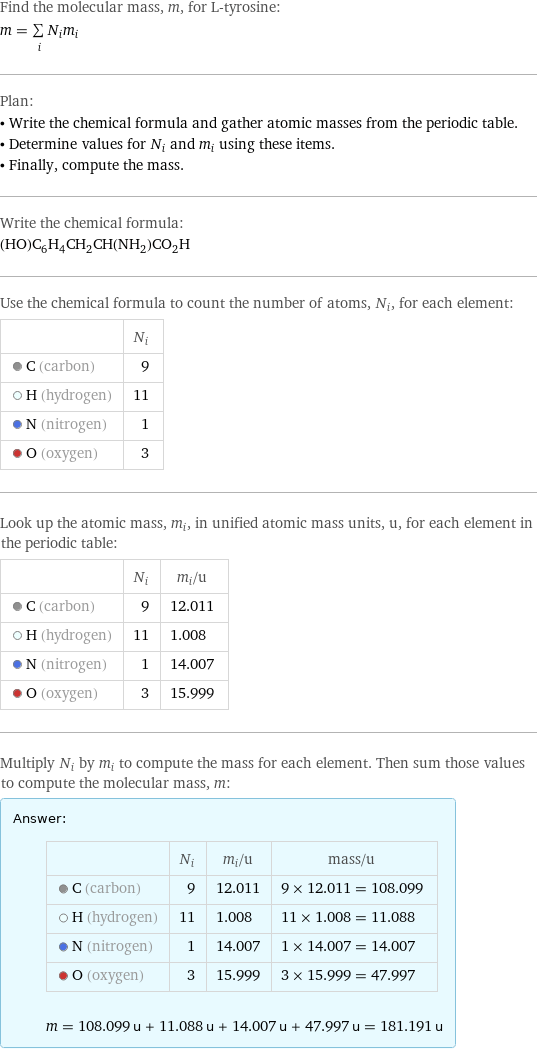Input interpretation

L-tyrosine | molecular mass
Result

Find the molecular mass, m, for L-tyrosine: m = sum _iN_im_i Plan: • Write the chemical formula and gather atomic masses from the periodic table. • Determine values for N_i and m_i using these items. • Finally, compute the mass. Write the chemical formula: (HO)C_6H_4CH_2CH(NH_2)CO_2H Use the chemical formula to count the number of atoms, N_i, for each element: | N_i C (carbon) | 9 H (hydrogen) | 11 N (nitrogen) | 1 O (oxygen) | 3 Look up the atomic mass, m_i, in unified atomic mass units, u, for each element in the periodic table: | N_i | m_i/u C (carbon) | 9 | 12.011 H (hydrogen) | 11 | 1.008 N (nitrogen) | 1 | 14.007 O (oxygen) | 3 | 15.999 Multiply N_i by m_i to compute the mass for each element. Then sum those values to compute the molecular mass, m: Answer: | | | N_i | m_i/u | mass/u C (carbon) | 9 | 12.011 | 9 × 12.011 = 108.099 H (hydrogen) | 11 | 1.008 | 11 × 1.008 = 11.088 N (nitrogen) | 1 | 14.007 | 1 × 14.007 = 14.007 O (oxygen) | 3 | 15.999 | 3 × 15.999 = 47.997 m = 108.099 u + 11.088 u + 14.007 u + 47.997 u = 181.191 u
Unit conversions

181.19 Da (daltons)

0.18119 kDa (kilodaltons)

3.0087×10^-22 grams

3.0087×10^-25 kg (kilograms)

181.2 chemical atomic mass units (unit officially deprecated)

181.25 physical atomic mass units (unit officially deprecated)
Comparisons as mass of molecule

≈ 0.25 × molecular mass of fullerene ( ≈ 721 u )

≈ 0.93 × molecular mass of caffeine ( ≈ 194 u )

≈ 3.1 × molecular mass of sodium chloride ( ≈ 58 u )
Corresponding quantities

Relative atomic mass A_r from A_r = m_aN_A/M_u: | 181

Molar mass M from M = m_aN_A: | 181 g/mol (grams per mole)

Relative molecular mass M_r from M_r = m_mN_A/M_u: | 181

Molar mass M from M = m_mN_A: | 181 g/mol (grams per mole)